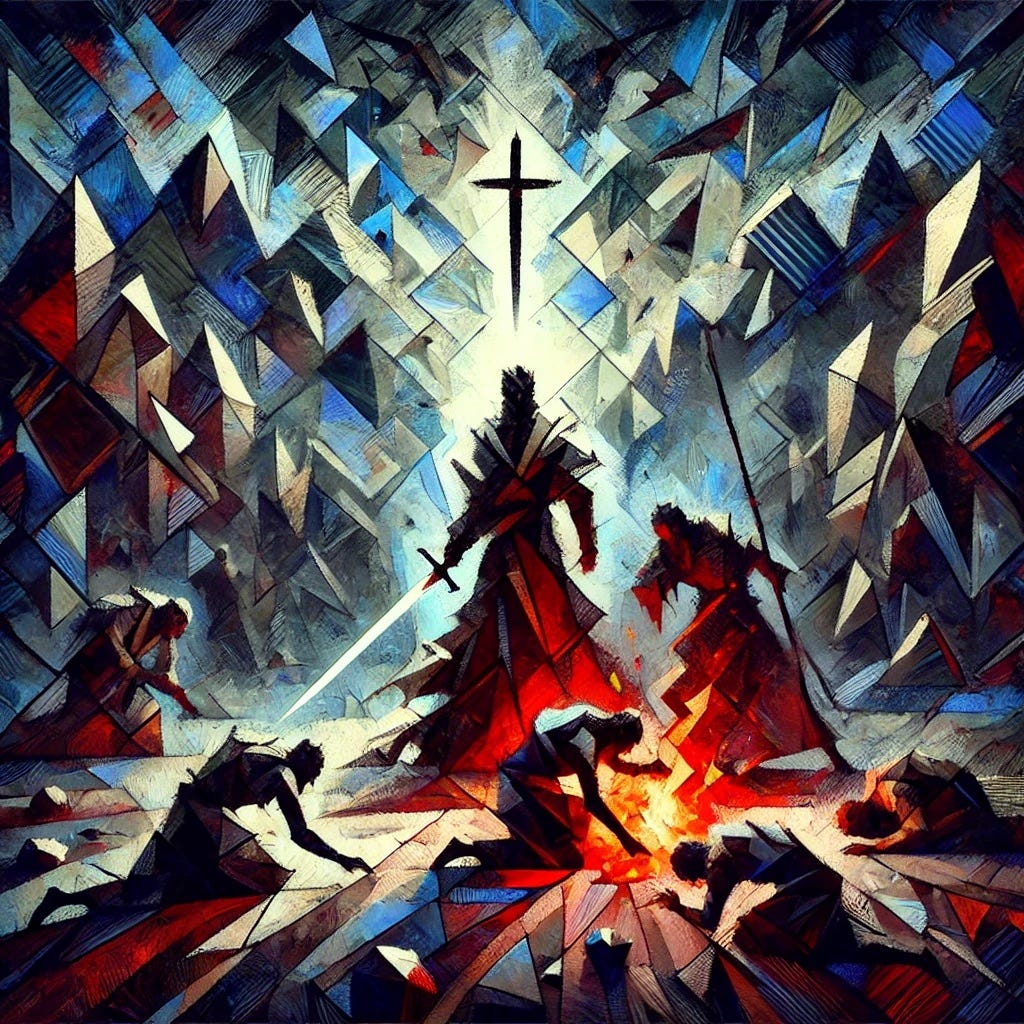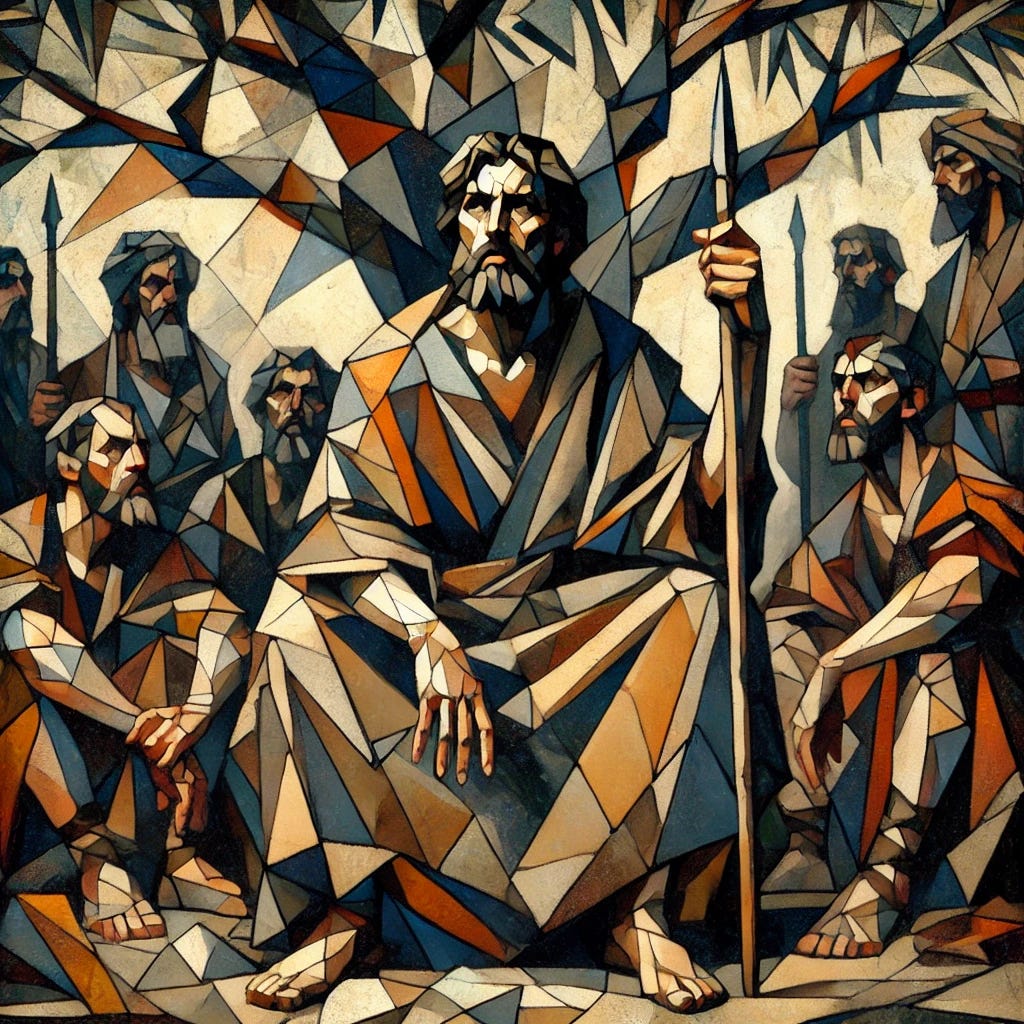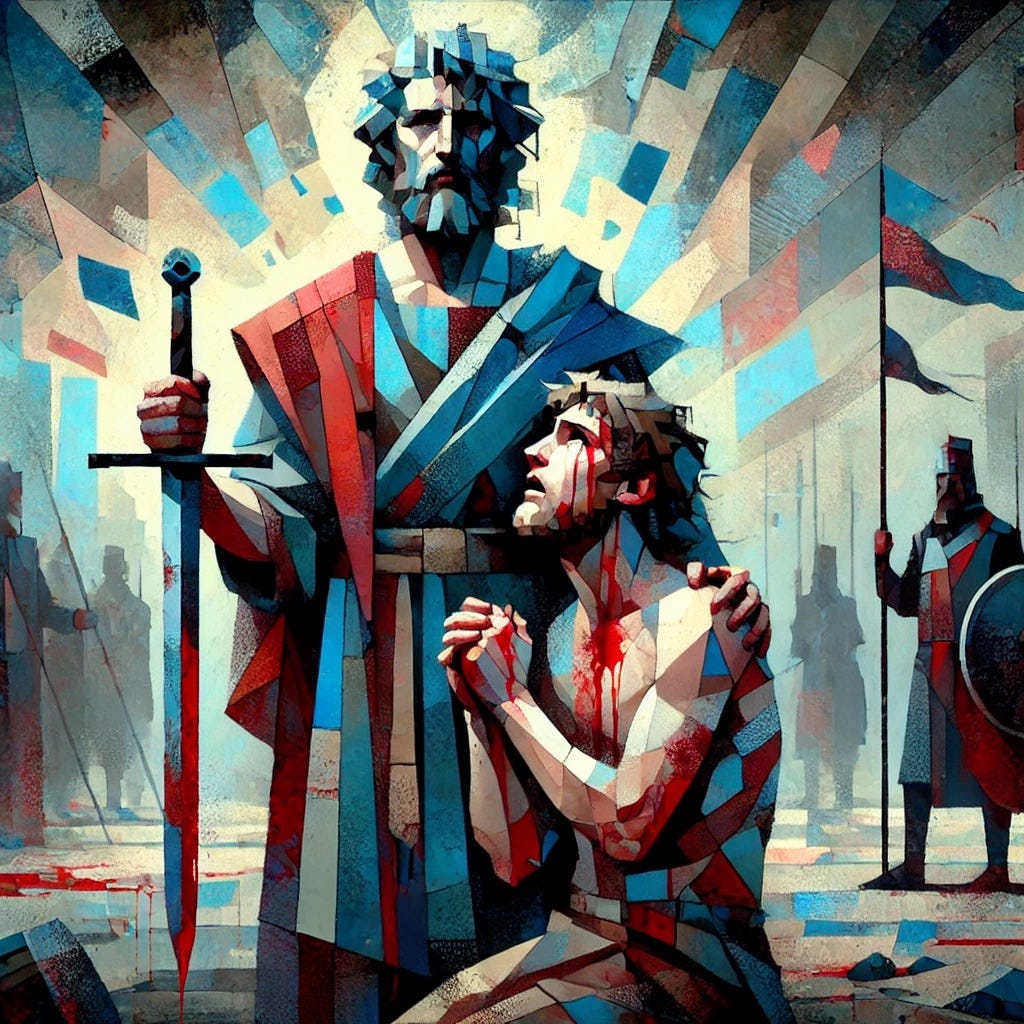Ziklag W - 9.17 - Blasphemy!
City on the Edge: The Blasphemy of Doeg the Edomite
SOS Discipline - Daily Proverb and Red Letter Reader
Whatever you may say, a man knows what he knows. cf. Pr. 12:9
What you are willing to see has a great deal to do with what you will see. cf. Mt. 11:14
City on the Edge: The Blasphemy of Doeg the Edomite
An Epic Retell
The sun sets behind the craggy hills of Nob, casting long shadows over the sanctuary of the Lord. The flickering light of the lampstands in the tabernacle struggle to hold back the encroaching night, a night that will soon be stained with betrayal, slaughter, and the cries of the innocent. At the heart of it all stands a man who will be remembered not for valor or faith, but for an act so vile that the annals of Israel’s history will curse his name: Doeg the Edomite.
The sanctuary city of Nob—a haven of peace, where the priests of the Lord serve faithfully, keeping the flame of worship alive in the shadow of the rising King Saul’s paranoia. The High Priest Ahimelech, descendant of the once-great Eli of the house of Ithamar, goes about his sacred duties, unaware that his life and the lives of his fellow priests will soon be drenched in blood.
Ahimelech, noble and wise, stands at the entrance of the tabernacle, his eyes narrowing in suspicion as a figure approaches: David, the valiant warrior who had once slayed the giant Goliath but now roams the wilderness, a fugitive from Saul’s wrath. David, disheveled but determined, pleads for provisions. He claims to be on the king’s secret mission, but Ahimelech’s heart knows that something darker is at play.
“I have no ordinary bread,” says Ahimelech, “only the consecrated bread.”
David, desperate, accepts it. The bread of the Presence—bread meant for priests alone—is handed to him, and with it, Goliath’s sword, which had been kept as a trophy of victory. The priest, sensing the danger but trusting the Lord, sends David on his way. But what Ahimelech does not see, hidden in the shadows of the sanctuary, is the sharp-eyed Doeg the Edomite, servant of Saul, who watches this entire exchange with malicious intent.
The Threat of Paranoid Madness
Under a tree outside of Rama, King Saul, once Israel’s hero, now trembles with paranoia and rage. He sits, throneless, brooding under the weight of his crumbling reign and chasing his most loyal subject with murderous zeal. His heart, once humble before the Lord, has been twisted by jealousy and fear. The Spirit of God has left him, and in its place, a darkness festers.
“David conspires against me!” Saul snarls. “He seeks to tear the kingdom from my grasp!” Around him stand his loyal men—some loyal in name, others only in fear. But among them, standing slightly apart, is Doeg the Edomite, his eyes glinting with a twisted eagerness to rise in favor.
Suddenly, Doeg steps forward, a serpent in human form. “My lord, I have seen David,” he hisses. “He went to the priests at Nob. The priest Ahimelech gave him bread and a sword. He aids your enemy.”
Saul’s eyes flare with rage. “The priests of the Lord have turned against me!” His hand clenches the hilt of his spear. “Bring them to me, all of them!”
Ahimelech and the priests of Nob are dragged before Saul, trembling yet dignified. In the stillness of the royal court, Saul’s voice echoes with venom.
“Why have you conspired against me, priest? Why have you aided my enemy?”
Ahimelech, with calm defiance, raises his head. “Who is more loyal to you than David, the king’s own servant? I did not know he fled from you.”
But Saul is beyond reason. He orders the death of Ahimelech and all the priests. The warriors around him hesitate, trembling. Even they, hardened as they are by war, cannot bring themselves to raise their swords against the priests of the Lord.
Then, from the shadows, steps Doeg.
“I will do it,” he whispers, his voice like a cold wind. His blade gleams as he unsheathes it.
And so begins the blasphemy—a massacre so vile that it will send shockwaves through the kingdom. Doeg, with no fear of the Lord in his heart, slashes through the defenseless priests, spilling their blood on sacred ground. Eighty-five priests fall beneath his sword. Blood pools at his feet, and the light of the lampstands flickers, their flames struggling to stay alive in the face of such darkness.
To What Ends?
As the massacre unfolds, a lone priest escapes into the night—Abiathar, the son of Ahimelech, bloodied and terrified. He flees from Nob, carrying with him the last remnants of the house of Eli, whose line had been cursed long ago due to the sins of Eli’s sons, Hophni and Phinehas.
Abiathar stumbles into the camp of David, the fugitive anointed to be king. His eyes are wide with shock, his robes stained with the blood of his father and his brothers.
“They are dead,” Abiathar gasps. “All of them… the priests… my father…”
David’s face darkens with sorrow and rage. He knows the weight of this sin rests, in part, on his shoulders. “I knew it,” he says, his voice heavy with guilt. “That day, when I saw Doeg, I knew he would betray us. I am responsible for the death of your family.”
But in Abiathar’s eyes, there is no blame—only desperation, only the hope that justice will one day be served. David, now not only a fugitive but the protector of the last priest of Nob, swears that the house of Saul will fall, and Doeg’s treachery will not go unpunished.
The Final Fall of Eli
The prophecy of 1 Samuel 2:31-35 unfolds in full. The massacre at Nob marks the near-total destruction of the house of Ithamar, which had descended from Eli. Though Eli’s grandson Phinehas had borne sons—Ahitub, who begat Ahimelech and Ahijah—now, only Abiathar remains.
But as the years pass, the wheels of divine judgment continue to turn. Abiathar serves David loyally, but his fate is already sealed in the courts of heaven. 1 Kings 2 tells us that Abiathar would later betray David’s house by siding with Adonijah, David’s son, in a bid for the throne.
The final blow falls when Solomon, David’s rightful heir, ascends to the throne. Solomon, in a calculated act of both justice and mercy, spares Abiathar’s life but banishes him from the priesthood, thereby completing the rejection of the house of Ithamar.
“This fulfills the word of the Lord,” the writer of 1 Kings tells us, as Zadok, a priest of the line of Eleazar, steps into the high priest’s role. From this day forward, the priesthood passes to the house of Eleazar, leaving the cursed line of Eli to fade into history.
The Rise of Zadok Ben-Phineas-Ben-Eleazar
Far from the bloodshed of Nob, in the courts of King Solomon, the priest Zadok stands beside the newly anointed king. He is of the house of Eleazar, and his rise signals the fulfillment of an ancient promise.
Zadok had proven his loyalty to David during the Absalom rebellion, where the same Abiathar of Nob sided with the usurper to the throne. With the kingdom united under Solomon, Zadok is anointed as high priest and Abiathar and his line, the line of Eli, are deposed once and for all. For Zadok’s line, traced through Phinehas, the grandson of Aaron, now holds the high priesthood in thr name of Eleazar. Ithamar, through the folly of Eli, fulfilled as inherited son among his sons, will never rise to the office again.
The Legacy of Nob
From the flames of Doeg’s betrayal, the priesthood is reborn in righteousness, and the cycle of justice that had been set in motion generations before comes to a close.
The massacre of Nob is an event that echoes through history, a turning point where the fate of the priesthood and the destiny of kings are intertwined in a single moment of bloodshed. Doeg, the Edomite, will forever be remembered as a blasphemer, a man whose thirst for power and favor led him to strike down the servants of the Lord. The priests of Nob are examplers of the lesson of Job, the facts of original and corporate sin, and the grace of the God who saves us as he chooses.
In the midst of this darkness, the seeds of justice and mercy are sown. Abiathar, the last of Eli’s house, lived to see the judgment of God fulfilled, and in his place, Zadok, a priest of righteousness, would rise to bring the people of Israel back to the true worship of the Lord. So too, we sons of men have looked on the scars of the Living One, been washed in his Name, feasted upon his new Blood
If Doeg the Edomite’s betrayal is of the divine plan that weaves together the sins of the past, the justice of the present, and the hope of the future, all bound together in the epic struggle between kings, priests, and the God of Israel, then “He is risen,” should be all the confidence you need to pick up your spear and take the right kind of stand wherever you are today.






